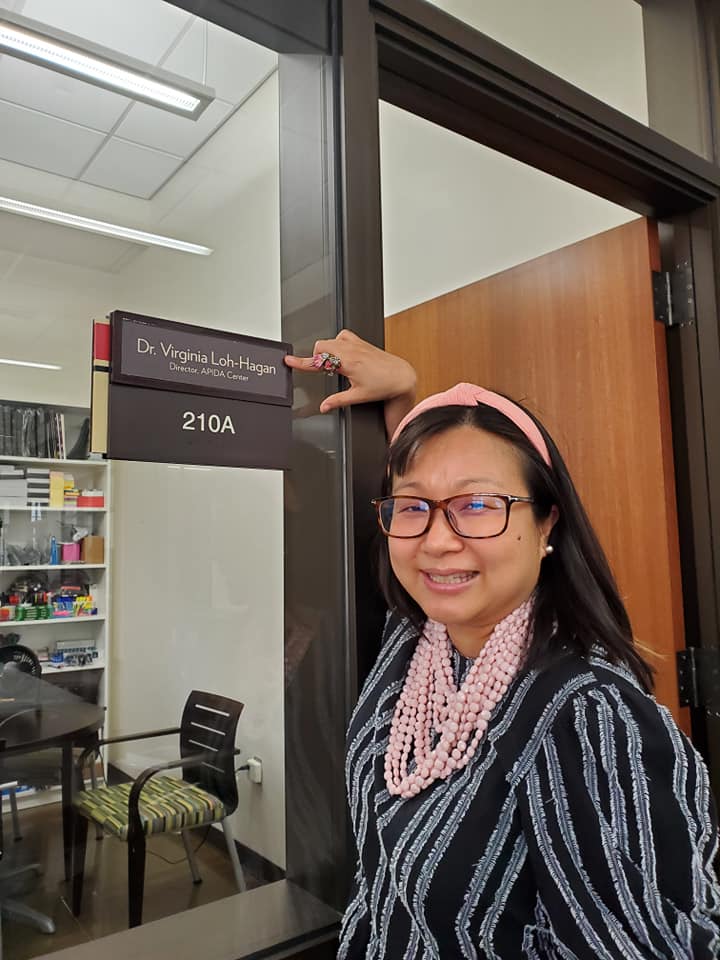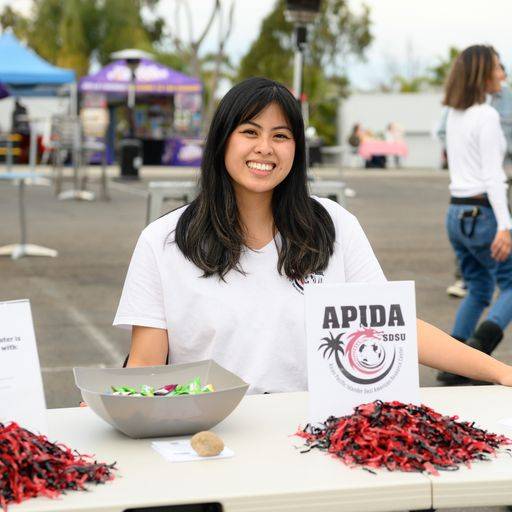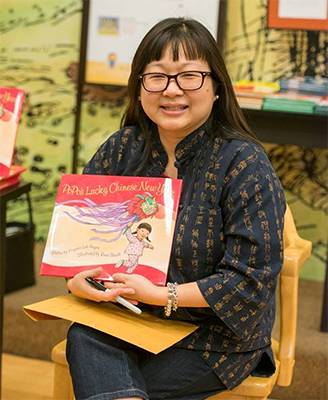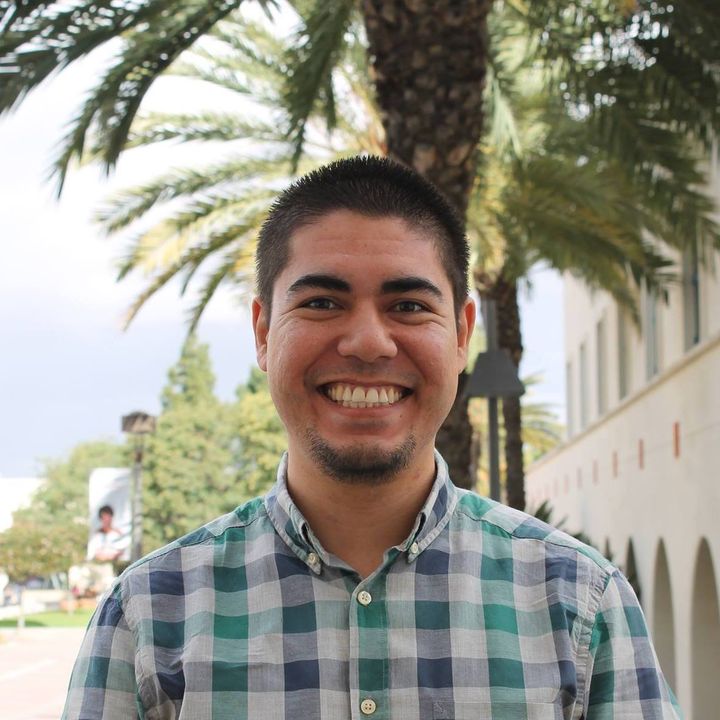Asian Pacific Islander Desi American Resource Center (APIDA)
- Aztec Student Union, 210A-K (Mail Code: 7450)
- Monday through Thursday 10:00am to 8:00pm, Friday 10:00am to 4:30pm
- [email protected]
- Join our Contact List
About Us
Mission Statement
The SDSU APIDA Center is open and available to all members of the SDSU community. We work to facilitate the academic and personal success of students by providing relevant and accessible programming, resources, and services that support academic achievement, community-building, on- and off-campus partnerships, and advocacy. We are committed to the inclusion of APIDA people’s unique histories, cultures, and perspectives in campus programs and curriculum. At our core, the APIDA Center strives to increase the voice and visibility of APIDA students, faculty, and staff. We also support allies and those wanting to learn more about the APIDA community. All are welcome here!
Coming Soon!
Snapshot 2021-22
What is the history of the “Asian American” identifier?
Early Asian immigrants were known by their specific ethnicities (i.e., Chinese American). This changed in the 1960s when activists Emma Gee and Yuji Ichioka organized to fight for equal rights. Inspired by the Black-led Civil Rights Movement, they used the term “Asian American” to bring together groups of people from different Asian backgrounds. With this uniting term, Asian American students joined together to help form the Third World Liberation Front (TWLF), a coalition of ethnic student groups in 1968. Students and activists protested the lack of diversity on college campuses and advocated for Ethnic Studies programs. In the wake of this solidarity, Asian Americans across the United States would continue to participate in political organizing and community building through the use of shared identifiers for the community. As such, the use of the "Asian American" label is a strategic political move.
What are the benefits of having a shared identifier?
A shared identifying term that contains diverse identities is helpful because it allows for solidarity in identity. With the actions of the Third World Liberation Front leading the way, additional political and social causes have garnered influence and visibility with the application of a shared label of our communities. For example, the murder of Vincent Chin in 1982 became an event that sparked collective political activism from the community. Additionally, persistent stereotypes that APIDA people have faced is that of the Perpetual Foreigner and Model Minority. In order to combat these harmful stereotypes, our shared histories and experiences as well as our shared strength must be amplified. Using shared identifiers, diverse communities can build coalitions to create change.
What are the challenges of having a shared identifier?
However, a shared identifying term can be problematic as well as incomplete. The Asian American and Pacific Islander community consists of many different histories and heritages. A single term that is used to describe a diverse group can be unhelpful because of the erasure of nuanced issues. Because this group is so large, it may be challenging to address the unique identities and struggles of all people represented. When the term is misused and misunderstood, we are assumed to be a monolith. A monolith in this context concludes that all the people who identify under a shared label are the same. We must actively engage in narratives that highlight the diversity of our community.
What are some shared identifiers for this community?
Today, several terms are available to describe Asian American and Pacific Islander populations. However, they are not interchangeable because of distinct views and histories regarding the meaning and usage of each term. Some of these terms include Asian American, Asian Pacific American (APA), Asian American Pacific Islander or Asian American & Pacific Islander (AAPI), Asian Pacific Islander Desi American (APIDA), Asian American Native Hawaiian Pacific Islander (AANHPI), and more. Many of these terms come from government classifications or the community itself.
What are the in-community issues with identifiers?
In using terms like APA or AAPI, Pacific Islanders often feel clumped in with Asian Americans. Until 2000, the U.S. Census even listed both groups in the same racial category. For generations, Asian Americans and Pacific Islanders faced similar struggles. The label of AAPI, and other similar labels, empowered people to come together for collective community and political action. This designation is accurate when amplifying the shared causes of Asian Americans and Pacific Islanders. However, erasure of the Pacific Islander experience can occur when this label is used solely for Asian American issues. Pacific Islanders have unique histories and experiences that need to be recognized. When using "PI," be intentional about including their voices, issues, etc.
To support the amplification of Pacific Islander causes and experiences, Native Hawaiian Pacific Islander (NHPI) became a new identifier. The expansion of this acronym brings more attention to Native Hawaiian and Pacific Islander communities, experiences, and issues. This action also separates these causes from the Asian American narrative. Native Hawaiian and Pacific Islander communities advocate for centering NHPI people and organizations. The term NHPI facilitates coalition building and political organizing within these communities. Organizations today must focus on supporting all of the groups they claim to represent.
Which identifier should be used?
Each community can and should determine the identifier they choose to use. Take time to understand the histories and meanings of these terms and intentionally use these shared identifiers with all represented groups in mind. All of the terms are helpful when used for solidarity and togetherness. However, when we use these terms, we must remember to consciously identify all groups we are addressing. Therefore, when we choose a shared term for use, we are highlighting and championing every group.
Why does the SDSU APIDA Center use “APIDA”?
At the SDSU APIDA Center, we use the term APIDA, which stands for Asian Pacific Islander Desi American, which seeks to highlight the diversity of our community. Under this label, we strive to be inclusive of all people whose identities are rooted in APIDA ancestry. Most specifically, we are showcasing the ethnicities of Asia, the Pacific Islands, and South Asia, which is signified by the term Desi. We are striving to be explicitly inclusive of this diverse collection of identities and ethnicities represented in our community in order to combat the erasure of these identities. We hope the APIDA Center can spark vital discussions about representation in all of our communities.
Note that in the Fall of 2019 when we wrote the proposal to establish the APIDA Center, student activists discussed various terms. The two final identifiers were AAPI and APIDA. We ultimately chose APIDA to represent our student community.
What are different Asian/APIDA identities?
Asians and Pacific Islanders are generally grouped by regions. There is tremendous diversity in Asia and the Pacific Islander regions with more than 40 countries and additional ethnicities represented. The notions of ethnic and national identity carry complex meanings related to politics, societies, and families. Below are some of the most commonly understood groupings of the identities of the people in our community. While this list is comprehensive, there are many variations:
- Asian - This term refers to people with ancestry from the following regions in the continent of Asia: (1) Central Asians: Afghani, Armenian, Azerbaijani, Georgians, Kazakh, Kyrgyz, Mongolian, Tajik, Turkmen, Uzbek; (2) East Asians: Chinese, Japanese, Korean, Okinawan, Taiwanese, Tibetan; and (3) Southeast Asians: Bruneian, Burmese, Cambodian, Filipino, Hmong, Indonesian, Laotian, Malaysian, Mien, Papua New Guinean, Singaporean, Timorese, Thai, Vietnamese
- Pacific Islander - This term refers to people with ancestry from Polynesia, Melanesia, and Micronesia. It refers to the indigenous and original peoples of these island regions: (1) Native Hawaiians: kānaka ʻōiwi, kānaka maoli, and Hawaiʻi maoli; and (2) Pacific Islanders: (in the United States Jurisdictions & Territories) Carolinian, Chamorro, Chuukese, Fijian, Guamanian, Hawaiian, Kosraean, Marshallesse, Native Hawaiian, Niuean, Palauan, Pohnpeian, Samoan, Tokelauan, Tongan, Yapese
- Desi - "Desi," a Sanskrit word that means land or country, refers to the people with ancestry from the Indian subcontinent and/or South Asian regions. However, this label is not accepted by all those with ancestry from this region. This label sometimes refers to the peoples and cultures of India, exclusive of the other countries in this region. In addition, previous generations perceive "Desi" to be a derogatory term meaning "rural." However, Desi youth in the United States have reclaimed the term to exert their voice. Therefore, our Center uses Desi in the acronym APIDA to support the rising Desi youth activism movement; yet, we strive to amplify all peoples and cultures represented in South Asia (i.e., Bangladeshi, Bhutanese, Indian, Maldivians, Nepali, Pakistani, Sri Lankan).
- American - A distinction needs to be made between being Asian versus American. The American identity includes issues around colonization, imperialism, citizenship, generational status, and more.
Center Staff
Dr. Virginia Loh-Hagan
Director of the APIDA Center
[email protected]
 Dr. Virginia Loh-Hagan is the inaugural Director of the Asian Pacific Islander Desi
American (APIDA) Center at San Diego State University. She opened the APIDA Center
during the pandemic on July 1, 2020. She strives to establish an inclusive and supportive
community for APIDA-identifying students, faculty, and staff. She is also the Founder
and Chair of the SDSU APIDA Employee Resource Group. Previously, she served as a faculty member in SDSU’s College of Education where
she directed the Liberal Studies program, coordinated several international travel
abroad programs, led teaching credential programs, coordinated clinical practice and
EdTPA efforts, and taught various courses in education and literacy. Prior to working
at SDSU, she was a K-8 classroom teacher, community college reading instructor, program
chair for an online university, and research fellow for the University of Pittsburgh.
She is the 2023 recipient of California Reading Association's Armin Schultz Literacy
Award and the 2016 recipient of California Reading Association’s Marcus Foster Memorial
Award for outstanding achievement in reading. She has a B.A. in English and a Masters
in Elementary Education (K-8) and Special Education, specializing in Learning Disabilities
(K-12), from the University of Virginia. Upon graduation, she received the "Outstanding
Woman Scholar in Education" award. She earned her Doctorate in Education with an emphasis
in Literacy from SDSU-USD in May 2008; her dissertation—for which she received a ChLA
Beiter Graduate Student Research Grant award from the Children’s Literature Association
and for which she has published peer-reviewed articles and conducted presentations—was
a qualitative study on the cultural authenticity of Asian-American children's literature.
She has authored over 450 children's books and has several academic publications about
using multicultural children and young adult literature. Most of her books and research
address APIDA themes. She is serving on various book award committees and is the Cover
Editor and Book Nook columnist for "The California Reader," the premiere professional
journal for the California Reading Association. She is also serving as the Co-Executive
Director and Director of Curriculum Development for The Asian American Education Project; she is committed to ensuring APIDA histories and narratives are taught in K-12 and
beyond. Her hobbies include reading, crafting, gaming (tabletop board games), playing
piano, and binge-watching shows.
Dr. Virginia Loh-Hagan is the inaugural Director of the Asian Pacific Islander Desi
American (APIDA) Center at San Diego State University. She opened the APIDA Center
during the pandemic on July 1, 2020. She strives to establish an inclusive and supportive
community for APIDA-identifying students, faculty, and staff. She is also the Founder
and Chair of the SDSU APIDA Employee Resource Group. Previously, she served as a faculty member in SDSU’s College of Education where
she directed the Liberal Studies program, coordinated several international travel
abroad programs, led teaching credential programs, coordinated clinical practice and
EdTPA efforts, and taught various courses in education and literacy. Prior to working
at SDSU, she was a K-8 classroom teacher, community college reading instructor, program
chair for an online university, and research fellow for the University of Pittsburgh.
She is the 2023 recipient of California Reading Association's Armin Schultz Literacy
Award and the 2016 recipient of California Reading Association’s Marcus Foster Memorial
Award for outstanding achievement in reading. She has a B.A. in English and a Masters
in Elementary Education (K-8) and Special Education, specializing in Learning Disabilities
(K-12), from the University of Virginia. Upon graduation, she received the "Outstanding
Woman Scholar in Education" award. She earned her Doctorate in Education with an emphasis
in Literacy from SDSU-USD in May 2008; her dissertation—for which she received a ChLA
Beiter Graduate Student Research Grant award from the Children’s Literature Association
and for which she has published peer-reviewed articles and conducted presentations—was
a qualitative study on the cultural authenticity of Asian-American children's literature.
She has authored over 450 children's books and has several academic publications about
using multicultural children and young adult literature. Most of her books and research
address APIDA themes. She is serving on various book award committees and is the Cover
Editor and Book Nook columnist for "The California Reader," the premiere professional
journal for the California Reading Association. She is also serving as the Co-Executive
Director and Director of Curriculum Development for The Asian American Education Project; she is committed to ensuring APIDA histories and narratives are taught in K-12 and
beyond. Her hobbies include reading, crafting, gaming (tabletop board games), playing
piano, and binge-watching shows.
Mr. Matthew H Garcia is the APIDA Center's inaugural Associate Director. He started working at the APIDA Center on April 11, 2022. Matt is originally from Santa Maria, a small town on the Central Coast of California. He attended California State University, Long Beach where he earned a Bachelor's degree in Interpersonal and Organizational Communication Studies and went on to earn a Master’s degree in Postsecondary Educational Leadership with a Specialization in Student Affairs from San Diego State University. Matt has extensive management and programming experiences. He has worked at SDSU for over seven years serving in various positions starting in Student Organizations & Activities before transitioning to the Center for Fraternity & Sorority Life where he most recently served as the Interim Director. (Fun Fact: SDSU has the fourth largest fraternity and sorority community in California.) Matt identifies as a member of the APIDA community as he was raised by family members who immigrated from the Philippines, including his father. Besides identifying as Filipinx, he also identifies as a member of the Latinx and LGBTQ+ communities. Matt is in charge of the APIDA Center's advising initiatives and supports programming and outreach efforts. In his free time, he enjoys exploring new restaurants and activities in San Diego.

Ms. Angela Marie Subido
Assistant Coordinator of the APIDA Center
Ms. Angela Marie Subido is the Assistant Coordinator for the APIDA Center. She attended the University of California Santa Barbara where she earned her Bachelor’s degree in Asian American Studies and a minor in Applied Psychology. She has spent the past five years participating in meaningful work that addressed the needs of youth, students, people with disabilities, and low-income families in Santa Barbara, San Francisco, and San Diego. She is passionate about serving the APIDA community with creative outreach through food distribution, art sharings, educational discussions, and health services. She draws inspiration from the people she meets and is excited to help make those ideas come to life. She identifies as Filipino American and has lived in San Diego for the majority of her life. Her hobbies include cooking, engaging in fitness activities, enjoying live music events, and spending time in nature.
Student Staff


